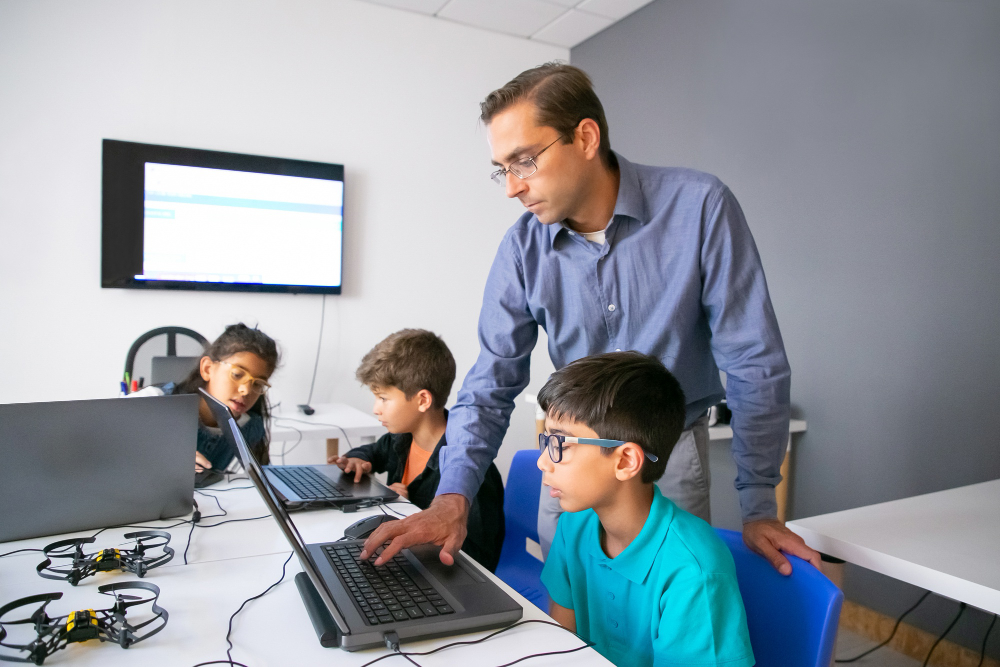The AI Revolution in Education: Personalization, Ethics, and the Evolving Role of Teachers
The landscape of education is undergoing a profound transformation, powered by the rapid advancements in Artificial Intelligence (AI). From elementary schools to universities, AI is no longer a futuristic concept but a present reality, reshaping how students learn, how teachers teach, and how educational institutions operate. This revolution promises unprecedented personalization, yet it also brings crucial ethical considerations and fundamentally redefines the role of educators.

Major Pointers for Students and Teachers:
For Students: Unlocking Tailored Learning Experiences
The most immediate and exciting impact of AI for students is the promise of personalized learning. Gone are the days of a strictly “one-size-fits-all” approach.
- Adaptive Learning Paths: AI-powered platforms can analyze your individual strengths, weaknesses, learning styles, and pace. If you excel in a subject, the AI can present more challenging material; if you struggle, it can provide additional resources, different explanations, or more practice exercises until you grasp the concept. This means you can learn at your own optimal speed, focusing on areas where you need the most support.
- Example (School Level): An AI math tutor provides extra practice problems on fractions for a student who consistently struggles, while offering advanced geometry challenges to another who has mastered basic algebra.
- Example (College Level): An AI-driven platform recommends research articles and specific modules based on a student’s performance in previous assignments and their declared interests within a broader subject.
- Example (School Level): An AI math tutor provides extra practice problems on fractions for a student who consistently struggles, while offering advanced geometry challenges to another who has mastered basic algebra.
- Intelligent Tutoring Systems & Chatbots: Imagine having a tutor available 24/7. AI chatbots and intelligent tutoring systems can answer your questions, clarify concepts, provide instant feedback on your work, and even engage in conversational learning, making complex topics more accessible.
- Personalized Feedback and Assessment: AI can grade assignments, essays, and even provide detailed feedback on your writing, highlighting areas for improvement in grammar, structure, and content. This immediate feedback helps you understand your mistakes and learn faster.
- Content Curation: AI can recommend relevant learning materials, videos, and articles based on your learning journey, helping you discover new resources and deepen your understanding.
For Teachers: Empowering Educators, Not Replacing Them
The AI revolution isn’t about replacing teachers, but empowering them to be more effective, strategic, and focused on the human element of education. Teachers are evolving into “learning architects” and mentors.
- Automating Administrative Tasks: AI can significantly reduce the burden of mundane tasks like grading multiple-choice questions, tracking attendance, scheduling, and even drafting routine communications. This frees up invaluable time for teachers to focus on what truly matters:
- Example: AI auto-grades quizzes, allowing teachers to spend more time on qualitative feedback for essays or engaging in one-on-one student discussions.
- Example: AI auto-grades quizzes, allowing teachers to spend more time on qualitative feedback for essays or engaging in one-on-one student discussions.
- Data-Driven Insights: AI platforms provide teachers with comprehensive data on student performance, identifying patterns, common misconceptions, and individual learning gaps. This data empowers teachers to make informed decisions about their teaching strategies and provide targeted interventions.
- Personalized Lesson Planning: AI tools can assist teachers in creating customized lesson plans and activities tailored to the diverse needs of their students, suggesting resources and approaches based on learning objectives and student profiles.
- Enhanced Student Support: With AI handling routine queries and providing initial support, teachers can dedicate more time to students who require deeper guidance, emotional support, or advanced mentorship.
- Focus on Higher-Order Skills: As AI handles factual recall and basic problem-solving, teachers can shift their focus to cultivating critical thinking, creativity, collaboration, communication, and complex problem-solving skills – qualities that are uniquely human and highly valued in the 21st century.
Ethical Considerations: Navigating the AI Landscape Responsibly
The power of AI comes with significant ethical responsibilities that students, teachers, and institutions must address.
- Data Privacy and Security: AI systems collect vast amounts of student data. Ensuring the privacy and security of this sensitive information is paramount. Institutions must implement robust data protection protocols and adhere to strict privacy regulations. Students and parents should be informed about what data is collected and how it is used.
- Bias and Fairness: AI algorithms are trained on data, and if that data contains biases (e.g., reflecting societal prejudices or underrepresenting certain demographics), the AI’s output can perpetuate or even amplify those biases. This could lead to unfair outcomes in grading, recommendations, or access to resources.
- Teachers and students must critically evaluate AI-generated content and be aware of potential biases. Institutions need to actively work on developing and using AI systems that are fair, transparent, and equitable.
- Teachers and students must critically evaluate AI-generated content and be aware of potential biases. Institutions need to actively work on developing and using AI systems that are fair, transparent, and equitable.
- Transparency and Explainability: Sometimes, it’s unclear how an AI system arrived at a particular conclusion or recommendation (“black box” problem). It’s crucial for AI tools in education to be as transparent as possible, allowing users to understand the reasoning behind their outputs.
- Academic Integrity and Misuse: The ease with which generative AI can produce text raises concerns about plagiarism and academic dishonesty. Educators must adapt assessment methods and teach students about responsible AI use, emphasizing critical thinking and original thought.
- Students must learn to use AI as a tool for learning and research, not as a shortcut for independent thought and work. Proper citation of AI-generated content, where permitted, is essential.
- Students must learn to use AI as a tool for learning and research, not as a shortcut for independent thought and work. Proper citation of AI-generated content, where permitted, is essential.
- Human Connection and Social-Emotional Development: While AI offers personalization, it should not replace essential human interaction. Education is as much about social-emotional development, empathy, and collaborative learning as it is about acquiring knowledge. Maintaining the human element in the classroom is vital.
Conclusion: A Collaborative Future
The AI revolution in education is not a threat to human educators but a powerful partnership in the making. For students, it offers a pathway to highly personalized and engaging learning experiences. For teachers, it provides tools to streamline tasks, gain deeper insights into student needs, and refocus on inspiring and mentoring the next generation.
However, harnessing the full potential of AI in education requires careful consideration of the ethical implications. By prioritizing data privacy, addressing biases, promoting transparency, fostering responsible use, and preserving the irreplaceable human connection, we can collectively navigate this revolution to create a more effective, equitable, and enriching educational future for all. The conversation about AI in education is ongoing, and active participation from students, teachers, parents, and policymakers is crucial to shape its trajectory responsibly.

